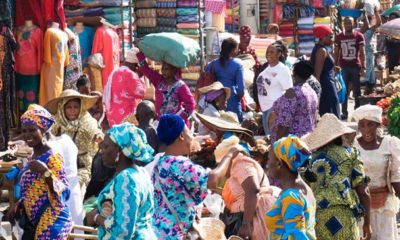News
Neglected Tropical Diseases: Over 100m Nigerians Now At Risk

Alarm bells are ringing again for Nigeria, over increasing incidences of Neglected Tropical Diseases (NTDs), which is currently 21 in the country.
Current data shows that over 100 million Nigerians (two of every three) are infected by or at risk of one or more NTDs, National Coordinator of NTDs in the Federal Ministry of Health, Fatai Oyediran, has said
Nigeria shoulders 50% burden of about 1.7 billion people affected In Africa, by Neglected Tropical Diseases (NTDs), and 25 percent globally, he said during a presentation by the Programme Manager, Snakebite Envenoming, NTDs Division in the Ministry of Health, , Adebayo Peters.
Occasion was the 6th edition of the global celebration of the NTDs Day declared by the World Health Organisation (WHO) with a mandate to wipe it out in 2030.
According to Oyediran, the issue has become so critical the Federal Government is considering the use of drones for the distribution of drugs in the North East which, aside NTDs also contends with banditry, kidnapping and other crimes.
With the theme, ‘Unite, Act and Eliminate NTDs as a Catalyst for Global Health and Sustainable Development’, the event brought together experts to strengthen the commitment to ending the communicable and non-communicable diseases.
READ ALSO: Lagos Announces Centres for Free Medical Outreach –Alaafia Eko: See List
READ ALSO: Dehydration: Symptoms, Causes, Prevention & Treatment
“Over 100 million (two of every three Nigerians) are infected by or at risk of one or more NTDs”, Oyediran said,said, adding: “It is expected that with investment of ($18,785,902) for five years, Nigeria will achieve elimination of blinding trachoma, (100 percent); 22 States endemic for Onchocerciasis will no longer need treatment.”
The Technical Assistant to the Minister of Health and Social Welfare, SWAP Coordinating Office, Zaiyanatu Abubakar Umar, said ending the scourge of NTDs is a collective responsibility.
“The Collaborative Action Strategy (CAS) is meant to shift ways of working amongst global, regional, and country level partners on key actions, roles, and coordinated approaches at country level”, she said,.
“It is designed to add practical but transformative value to Nigeria’s existing health campaigns and health care efforts including dealing with Neglected Tropical Diseases (NTD).
“The strategy seeks to guide partners toward a future state where programs collaborate effectively with each other and with corresponding health services to maximize the impact of campaigns on health outcomes, and ultimately aims to catalyze stronger, more resilient country-led health systems in the long term.”
According to the Minister of State for Health, Dr Iziaq Salako, the NTDs would be a thing of the past in Nigeria by 2030.
“The 2021–2030 WHO NTDs Roadmap provides ambitious targets and innovative approaches. Nigeria remains committed to its implementation, focusing on accountability, multi-sectoral integration, and political commitment to ensure sustainability.
“The fight against NTDs is crucial to achieving Universal Health Coverage, Sustainable Development Goal Three and eradicating poverty”, he added.
Also speaking, the Country Director of Helen Keller International and Chair, Governmental Development Organisations (NGDOs), Aliyu Mohammed, reaffirmed his organisation’s commitment to deepening its support in helping Nigeria eliminate leprosy and other NTDs by 2030
“We have been partnering with the government to tackle these issues, and we are stretching our collaboration to ensure we eliminate all phases of leprosy and other NTDs as part of the broader fight against national poverty.”
Highlighting the critical role of Water Sanitation and Hygiene (WASH) in combating diseases including NTDs , the UNICEF NTDs National Consultant, Hilary Adie said:
READ ALSO: 9 Die During Fitness Race For Police Recruitment
READ ALSO: ‘My Greatest Mistake Was To Have Wrong People As Friends’
“Thank you to the Federal Ministry of Health and the Nigerian government for providing a Clean Nigeria Campaign office to ensure communities become open-defecation-free”, he added.
The Country Director CBM Global, Abdulazeez Musa, emphasized the need for sustainable funding, innovative solutions, and a commitment to equitable healthcare for all, stated.
“To act now means recognizing that time is of the essence. Delayed action leads to lost lives, diminished livelihoods, and prolonged suffering”, he added.
Neglected Tropical Diseases in Nigeria include Lymphatic filariasis, Buruli ulcer, Human african trypanosomiasis, Leishmaniasis, Leprosy, Onchocerciasis, Schistosomiasis, Trachoma, Chagas disease, Dracunculiasis, Soil-transmitted helminthiasis, Dengue, Foodborne trematodiases, Rabies and Scabies



























